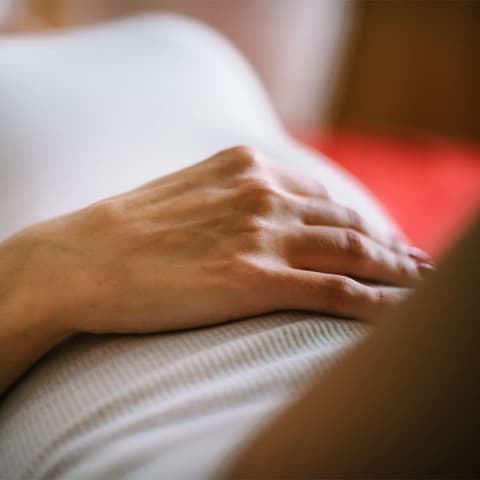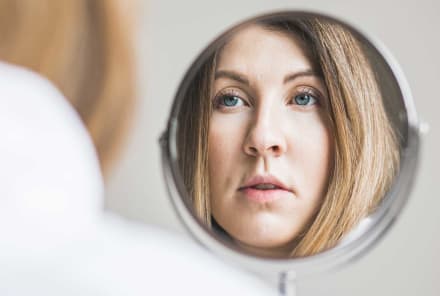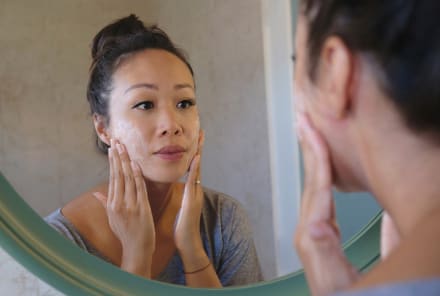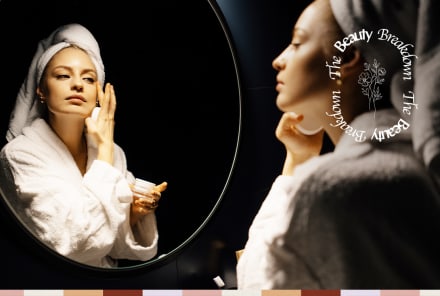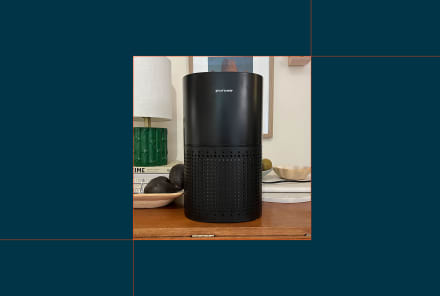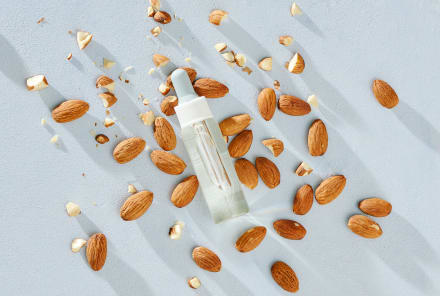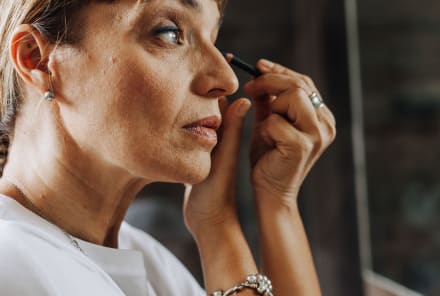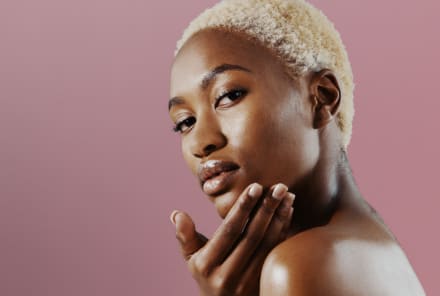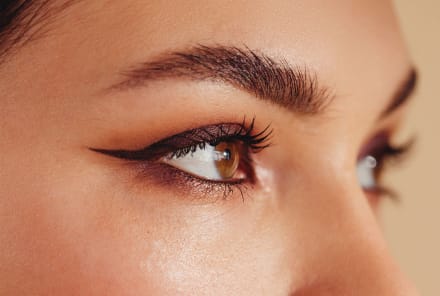Advertisement
Sun Poisoning Is A Real Thing & It’s More Common Than You Think

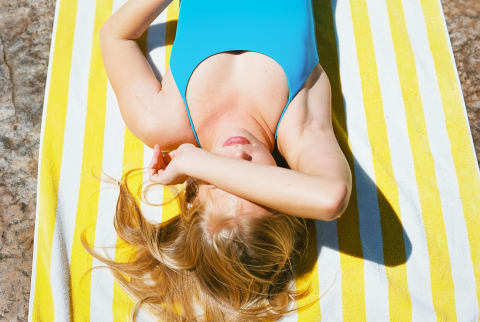
A recent TikTok video gained over 33 million views with a cautionary caption: #wearsunscreen. The shocking series of clips displays an intense process of significant skin swelling and blistering—the user had experienced “sun poisoning,” a term that instantly caught my eye (and clearly that of many others, too).
So I quickly asked dermatologists for the 101. Below, everything you should know about the common condition and how to protect yourself.
What is sun poisoning?
“Sun poisoning is a severe case of sunburn,” board-certified dermatologist Bradley Glondy, M.D., FAAD, explains. “It causes the skin to blister and can become very painful and uncomfortable.”
These are common signs of any intense sunburn, but sun poisoning can become a larger issue. “Sometimes sun poisoning can be so severe that you can experience systemic symptoms, including fevers and chills,” Glondy explains. Hence, why some other viral TikTok videos depict people on the edge of vomiting, crying, and in severe states of physical and mental stress.
“The exact cause of sun poisoning is still not fully understood, but it is believed to be a combination of factors, including genetic predisposition, individual susceptibility to UV radiation, and prolonged or intense exposure to the sun,” board-certified dermatologist Dustin Portela, D.O., FAAD, tells mindbodygreen.
Portela also explains that the intense inflammatory response from the skin can tip off other inflammation signals throughout the body, causing someone to feel unwell.
Signs you have sun poisoning
“It is important to note that the term ‘sun poisoning’ is often used colloquially to describe severe sunburn, rather than an actual poisoning,” Portela explains. Here are a few signs you actually have the condition, not just a bad sunburn.
- You develop intense and painful blisters
- You have a fever
- You keep getting chills
- You have an intense headache
- You’re nauseous
- You have muscle aches
If it’s just a sunburn (which, mind you, is still a serious skin concern) then you may experience redness, peeling, tenderness, and discomfort, but the symptoms won’t manifest into a full-body, illness-like reaction.
How to treat it at home
While prevention is the best method here, there are ways to treat some cases of sun poisoning at home.
“Mild cases can be treated at home with a cool compress, staying hydrated, and pain medication,” Glodney says.
However, “In cases where sunburn has resulted in blisters, dermatologists may provide guidance on proper blister care,” Portela adds. “This typically involves keeping the blisters clean, avoiding popping or picking at them, and applying antibiotic ointments to prevent infection.”
As with any sunburn, make sure to avoid irritating products on the damaged skin (fragrance, exfoliants, and the like) and look for soothing ingredients, like aloe vera, colloidal oatmeal, ceramides, vitamin E, shea butter, postbiotics, etc.—more general sunburn remedies here, if you’re curious.
Sun poisoning should generally heal within a week, but the exact duration will depend on severity and treatment. As a general rule: The more diligent you are with topical and internal care, the quicker it will heal.
When to see a professional
If your symptoms become worse or unmanageable, you should definitely consult a physician. “Some of the treatments done in office are cold compress, IV fluids, pain medication, antibiotics, topical steroid creams, and even oral steroids,” Glodney says. Some of these may be more effective for severe cases of sun poisoning.
How to prevent it
By now, we'll go ahead and assume you know that sun poisoning is a serious health concern, both for your skin and overall health, so it’s best to take precautionary measures. Follow these steps below to prevent sun poisoning in the first place:
- Wear SPF & reapply: Wearing sunscreen is a great first step, but you shouldn’t stop at one application in the morning. Instead, apply your SPF every two hours that you spend in the sun, be it at the beach, on a hike, or even sitting on your front porch in direct sunlight.
- Avoid peak sun hours: “Avoid staying out in direct sunlight between the hours of 10 a.m. to 2 p.m.,” board-certified dermatologist Blair Murphy-Rose, M.D., FAAD explains. “Be especially conscious of this, for example, when traveling to tropical climates,” she adds. This doesn’t mean you can’t be outside at all during this time, but try not to lounge in the sun during this window.
- Wear protective clothing: If you know you’ll be in the sun for extended periods of time, consider wearing sun-protective clothing, especially if you’re prone to sunburns as is.
Why this matters
Some of the content I saw under the #sunpoisoning search on TikTok unsettled me, as I noticed many people making light of this dangerous situation.
And look, I'm all about staying positive when faced with adversity, but I don't think we should view sun poisoning as a badge of honor or a way to rack up likes and comments. Remember: Not only do you risk ruining your vacation or putting a hindrance on the next week (or so) of your day-to-day life, but you’re also supercharging your risk of very serious skin concerns, like melanoma.
As the Skin Cancer Foundation notes, one in five Americans will develop skin cancer by age 70. Also, having five or more sunburns doubles your risk for melanoma, so it’s not something to downplay.
This doesn’t mean you should never step outside and avoid sunlight at all costs. It also doesn't mean you've "failed yourself" if you do unintentionally get sun poisoning. Rather, let it serve as a gentle reminder to nurture your skin and overall health—applying SPF only takes a minute.
The takeaway
Sun poisoning is a severe case of sunburn that can trigger symptoms like fever, chills, nausea, intense blisters, and more. To prevent sun poisoning, commit to reapplying SPF every two hours when you’re in the sun, wear protective clothing, and avoid lounging in the UV rays during peak hours. Here, a full guide to sun care, from experts.
Watch Next
Enjoy some of our favorite clips from classes
Enjoy some of our favorite clips from classes
What Is Meditation?
Mindfulness/Spirituality | Light Watkins
Box Breathing
Mindfulness/Spirituality | Gwen Dittmar
What Breathwork Can Address
Mindfulness/Spirituality | Gwen Dittmar
The 8 Limbs of Yoga - What is Asana?
Yoga | Caley Alyssa
Two Standing Postures to Open Up Tight Hips
Yoga | Caley Alyssa
How Plants Can Optimize Athletic Performance
Nutrition | Rich Roll
What to Eat Before a Workout
Nutrition | Rich Roll
How Ayurveda Helps Us Navigate Modern Life
Nutrition | Sahara Rose
Messages About Love & Relationships
Love & Relationships | Esther Perel
Love Languages
Love & Relationships | Esther Perel
